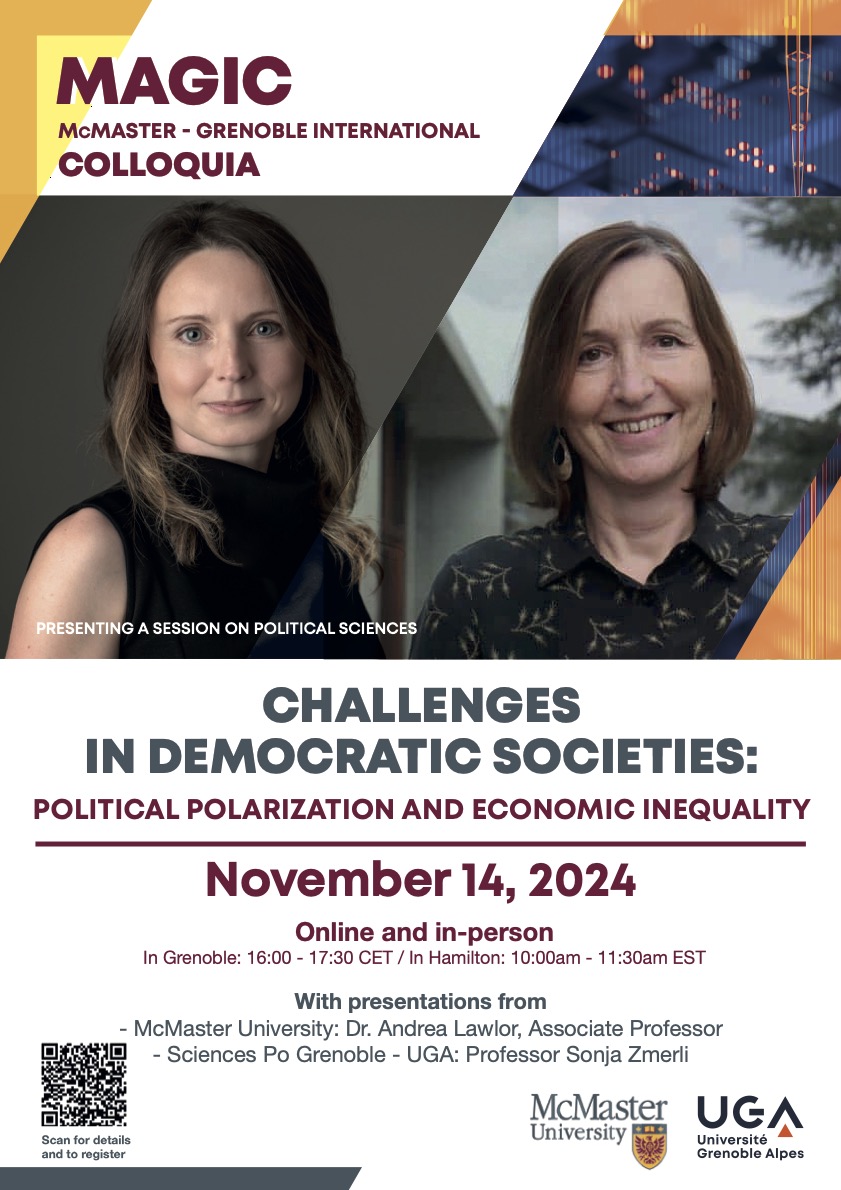“Challenges in Democratic Societies: Political Polarization and Economic Inequality”
Date: Thursday, November 14th, 2024
Time: 10:00-11:30 EST / 16:00-17:30 CET
Location: Hybrid | Virtual & In-person
- UGA: Salle Quermonne, Sciences Po Grenoble – UGA, 1030 rue des Universités, 38400 Saint-Martin-d’Hères
- McMaster: OIA Boardroom – 101 Gilmour Hall, 1280 Main St W., Hamilton, ON, L8S 4L8
- Virtual: https://univ-grenoble-alpes-fr.zoom.us/j/98533306430?pwd=TS9Dj966e5kFkK7f14Hq044Q6wmDAA.1
- Meeting ID: 985 3330 6430
- Password: magic

For questions regarding the Political Science Colloquium, please contact Maia Lepingwell-Tardieu: lepingam@mcaster.ca.
Expandable List
To register for the colloquium, please click here: Political Science Colloquium
Time |
Description |
| 10:00 EST / 16:00 CET | Presentation by Prof. Sonja Zmerli |
| 10:30 EST / 16:30 CET | Presentation by Dr. Andrea Lawlor |
| 11:00 EST / 17:00 CET | Discussion |
Sonja Zmerli
Presentation: “Representations of economic inequality in comparative perspective: How welfare state institutions, social norms and political discourse shape perceptions of inequality”
The presentation will introduce into the ERC funded project POLINEQUAL: The Politicisation of Economic Inequality. The Impact of Welfare Regimes, Elites’ Discourse and Media Frames on Citizens’ Perceptions, Justice Evaluations and Political Behaviour, its rationale and main interim findings. In POLINEQUAL’s conceptualisation, perceptions of economic inequality – and justice evaluations that instil them – originate from social norms that are deeply rooted in the ‘moral economies’ of welfare regimes and malleable as a function of individual exposure to and receptivity of facts, ideological cues, representations and heuristics of economic inequality. In principle, the project pursues two paths: It investigates the nature of interrelationships between media representations, ideological cues and individual perceptions and evaluations of economic inequality and to what extent the latter are conditioned by collectively shared distributive justice norms. Moreover, it investigates the impact of politically salient individual perceptions and evaluations of inequality on emotions and political behaviour. The research design is based on a mixed-methods approach, organized in five work packages and combining data derived from online focus groups, discourse and content analysis of party programmes and media representations, representative online surveys and online experimental framing studies in France, Great Britain and Sweden. A selection of empirical findings will be discussed that derive from focus group discussions, party programme analyses and representative online surveys.

Professor
Political Science, Sciences Po Grenoble – UGA
Dr. Sonja Zmerli is Professor of Political Science at Sciences Po Grenoble – UGA. Her research interests revolve around and relate political behaviour with economic inequality and welfare state in a comparative perspective. She is the co-editor of the first Handbook of Political Psychology in German language (2015, 2022 second edition, Nomos Publishing, with Ofer Feldman) and the co-editor of the first Handbook on Political Trust (2017, Edward Elgar Publisher, with Tom van der Meer). Her work was published in Public Opinion Quarterly, European Political Science Review, Social Science Research, amongst others.
Andrea Lawlor
Presentation: “Affective Polarization and Institutional Confidence in Canada”
Andrea Lawlor (McMaster University)
Laura Stephenson (University of Western Ontario)
Confidence or trust in political institutions has been in decline over the past 40 years (Norris 2011; Sniderman 2017; Warren 1999). Yet, there is considerable heterogeneity is how this phenomenon has manifested across time, countries, and individual institutions. Literature focusing on the American context has suggested that institutional confidence has been propelled downward by the existence of strong partisan inclinations (Keele 2005). As individuals become more antagonistic toward out-partisans, they may view even unaligned political institutions with greater skepticism. This consequence of affective polarization undermines traditional explanations for institutional confidence which were thought to be more durable. But is it happening everywhere? Canada has historically been identified as being somewhat resilient to this decline, though not fully immune (Citrin and Stoker 2018). As such, it provides an important testing ground to see whether the American experience of affective polarization travels – that is, whether it has permeated Canadian borders and if it is placing downward pressure on institutional confidence. We hypothesize that if the effects are universal, affective polarization will have a particularly pronounced effect on confidence in a variety of institutions, with those who identify as more polarized having less confidence because they view institutions as being related to out-partisan groups. We test our hypothesis not only on partisan institutions, such as the government in power, but also on non-partisan institutions, such as the civil service and the courts, to determine the extent to which affective polarization may be eroding the fabric of representative democracy.

Associate Professor
Department of Political Science and the Public Policy (Digital Society) Program, McMaster University
Dr. Andrea Lawlor is an Associate Professor in the Department of Political Science and the Public Policy (Digital Society) program at McMaster University. She specializes in the study of Canadian public policy, public opinion, as well as administrative and election law, including third party regulation in Canadian federal elections. Her work has appeared in the Canadian Journal of Political Science, Canadian Journal of Law and Society, and the Journal of Social Policy, among other venues. Dr. Lawlor holds a PhD from McGill University in Political Science and a MSL from Western University’s Faculty of Law.

